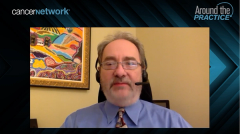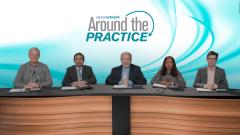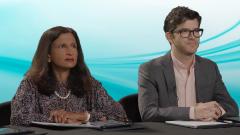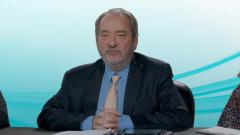
Rationale for Bispecific-Based Combinations in MM
Shared perspective on the potential role of ADCs, CAR T-cell therapy, and other agents in combination treatment with bispecifics for patients with multiple myeloma.
Episodes in this series

Transcript:
Robert Z. Orlowski, MD: It’s going to be even more complicated in the future because right now, we’re talking about single-agent bispecifics, but there are already abstract data that were presented at this meeting looking at combining some of these with daratumumab, for example. And teclistamab with daratumumab in the relapsed/refractory setting appears to have, in small numbers so far, but nearly a 100% response rate overall. It’s also being looked at in newly diagnosed disease, and there are early data about elranatamab and daratumumab having a wonderful response rate as well. So, as is the case for other novel drugs that start as single agents, we may wind up, we probably will use them in combinations in the future.
Amrita Krishnan, MD: I’ve been impressed with the teclistamab and daratumumab combination. We have patients who are truly daratumumab refractory who have had durable, deep responses with that combination.
C. Ola Landgren, MD: I agree with everything that was brought up here, but there are also combinations with IMiDS [immunomodulatory drugs] and also with gamma-secretase inhibitors because it was discovered by Damian Green [MD’s] group at Fred Hutchinson [Cancer Center] years ago in the laboratory. They took it into humans, you could see shedding of the target for BCMA, the antibody bound to BCMA, but the BCMA was separated from the myeloma cells, so if you block the enzyme that does the shedding, that would be a way to avoid this resistance mechanism. Many of these trials use gamma-secretase inhibition as well in combination, and other drugs as well.
Amrita Krishnan, MD: Can I ask a question around the table to get a Supreme Court poll? You have a patient, 4 prior lines of therapy, who comes to you now, and you have talquetamab, you have teclistamab, and let’s say you have 2 CAR [chimeric antigen receptor] T-cell therapies, a BCMA, and a GPRC CAR T available. What are you going to recommend to that patient? Because that’s the near future.
Robert Z. Orlowski, MD: Also, because they will at some point relapse, what would you offer to them after that? Which was going to be my next question to Ajay, but let’s go, starting with Ola.
C. Ola Landgren, MD: The question is, I have all these 4 options, they’re all available, they’re approved, and I’m having a conversation, what would I recommend? I would do what I said before. I would have a conversation with the patient about what’s the goal with therapy. If the patient says, “I’ve been on so many months of therapy, years of therapy, I am treatment fatigued.” That patient could be a good candidate for CAR T-cell therapy. But the patient could also say, “I would like to have an outpatient therapy. I know there are a lot of these antibodies, you can do them subQ [subcutaneously], or I don’t mind having a shorter infusion.” For that patient, I would segue, from all we know now, I would pick the BCMA because there is less known about the GPRC5D. So then I would go for the BCMA. But the majority of patients probably would go to the antibody in my clinic because of availability to CAR T cell. But I would have that conversation.
Ajay K. Nooka, MD: Yes. I would like to stick with the facts, so that it helps us to make the most informed decisions. As of today, we only have 1 bispecific approved, so I would be happy to choose the bispecific for somebody who may not be able to wait for a couple of months to allow for the CAR T manufacturing, and clearly, we can easily identify who are the CAR T patients and who are bispecific patients in our clinics. The good thing in the future, where myeloma is a place with a plethora of options, we did have them yesterday, we will have them in the future. With GPRC5D and BCMA as targets, we clearly are seeing the development of these new CAR Ts, and yesterday, we clearly saw the dysgeusia, as well as any of these skin changes, were so different comparing the bispecifics to the CAR T. We have a unique question of why, and I was expecting them to be so high with the CAR T, which is not the case, which is helpful, but only complicates the situation because these are well-tolerated CAR Ts, and you’ve got to pick and choose which one. Understanding what the future holds, like how do you want to treat this patient when the patient is relapsing, and how to sequence his treatment, is going to be a huge question, and the data will be coming in.
What we have is, these are not mutually exclusive. If somebody gets treated with a BCMA bispecific, they could get a BCMA CAR T down the line, which probably may not be my approach. I would do the opposite way, going with a CAR T targeting BCMA, followed by a bispecific targeting BCMA, because there were data that came in from…that were presented from the MajesTEC-1 trial. It is cohort C, which basically showed that yes, the responses are feasible among those patients who have been previously treated with BCMA-targeted treatment, but these responses may not be as evident as you saw with the BCMA patients. There is a 10% decline in the response, but if you put it in context, it is higher than what you expect with other treatments. So you’re seeing a 50% response rate instead of 60% response rates. That is good. No. 2, there are also data coming in from a Mount Sinai group that was published in Blood earlier. They took all the patients from Mount Sinai as well as Memorial Sloan Kettering [Cancer Center] who had received a BCMA-targeting CAR T, and one of the treatments that helped them get the longest PFS [progression-free survival], it’s very surprising, it’s the BCMA-targeting treatment again. This is allowing for us to conceptualize that these are not mutually exclusive. You don’t need to worry about choosing one or the other now, and these treatments could be sequenced, and finding the right sequence probably has to be happening when more data mature and are available for us in the future.
Robert Z. Orlowski, MD: Cesar?
Cesar Rodriguez, MD: There are 2 factors I would take into account. One is the disease. If it’s a rapidly progressing disease, and we can’t afford to wait these 6 to 10 weeks for the CAR T to be produced and reinfused, definitely go for a bispecific, and teclistamab is the only one that’s FDA approved, or a clinical trial. Then also, patients’ comfort. Because CAR Ts, especially ciltacabtagene autoleucel, which has the highest responses that we’re seeing out of all of the immunotherapies, it’s not completely benign. We’re seeing these prolonged cytopenias, viral reactivations, and potential neurotoxicity or Parkinson-like movements, so it has some potential risks. It’s on the patient’s comfort level, if they’re willing to do a 1 dose and done, so they can take a nice break off of therapy and feel like they are not patients with myeloma for a while, knowing there is that potential they might have to deal with cytopenias. But in terms of one or the other, all options are great. It’s which one is available at that moment.
Robert Z. Orlowski, MD: I would agree. What I would hope is that as we all do more research, hopefully together in this area, what we’ll be able to find is some way to pick out the people who are going to do well with the bispecific. And I don’t know if it’s T-cell exhaustion, for example, if someone’s got exhausted T cells, I’m not sure that a bispecific is the top choice. I’m not sure exactly how to measure that. But in somebody like that, I might think that a CAR T or maybe even an ADC [antibody-drug conjugate], if we get belantamab mafodotin coming back, that might be a better way to go, but that’s still a hypothesis.
Transcript edited for clarity.
Newsletter
Stay up to date on recent advances in the multidisciplinary approach to cancer.












































